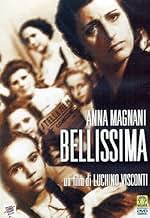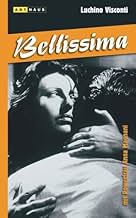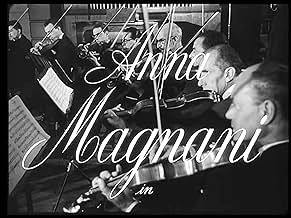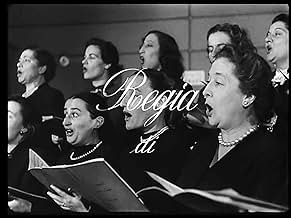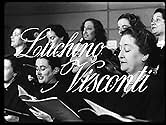AVALIAÇÃO DA IMDb
7,7/10
5,9 mil
SUA AVALIAÇÃO
Uma mulher de classe baixa tenta desesperadamente levar sua filha ao cinema.Uma mulher de classe baixa tenta desesperadamente levar sua filha ao cinema.Uma mulher de classe baixa tenta desesperadamente levar sua filha ao cinema.
- Direção
- Roteiristas
- Artistas
- Prêmios
- 1 vitória e 1 indicação no total
Liliana Mancini
- Iris
- (as Iris)
Vittorio Musy Glori
- Self
- (as Vittorio Glori)
Avaliações em destaque
In "Bellissima" (1951) an overambitious mother drags her 6 year old daughter to a talent show. The theme of "Bellissima" has something in common with "Little miss sunshine" (2006, Dayton & Faris). In both cases the daughter has no chance against the barby dolls that are her opponents. In "Little miss sunshine" the initiative is however by the daughter herself (although her parents ought to do more to protect her). In "Bellissima" the initiative lays cleary by the overambitious mother.
"Bellissima" was the end of the neo realist period in the carrier of Luchino Visconti, after films such as "Ossessione" (1943) and "La terra trema" (1948). The film is situated in a workers environment but live in this environment is no longer as bad as it was in the heydays of neorealism. In fact live in the showbusiness of Cinecitta is much more ruthless.
The lead actress Anna Magnani is still a true representative of the neo realist age. Think about her role in "Roma, citta aperta" (1945, Roberto Rossellini). In "Bellissima" she is brilliant as the mother who is cheated by the Cinecitta employees but who is also cheating herself against other mothers and their "bellissima's".
The film tells a rather simple story but makes maximum use of facial expressions and close ups, especially those of Magnani herself and Tina Apicella (playing her daughter Maria). Especially towards the end of the film the close ups are tellng us more than a thousend words.
"Bellissima" was the end of the neo realist period in the carrier of Luchino Visconti, after films such as "Ossessione" (1943) and "La terra trema" (1948). The film is situated in a workers environment but live in this environment is no longer as bad as it was in the heydays of neorealism. In fact live in the showbusiness of Cinecitta is much more ruthless.
The lead actress Anna Magnani is still a true representative of the neo realist age. Think about her role in "Roma, citta aperta" (1945, Roberto Rossellini). In "Bellissima" she is brilliant as the mother who is cheated by the Cinecitta employees but who is also cheating herself against other mothers and their "bellissima's".
The film tells a rather simple story but makes maximum use of facial expressions and close ups, especially those of Magnani herself and Tina Apicella (playing her daughter Maria). Especially towards the end of the film the close ups are tellng us more than a thousend words.
A wonderful, poignant masterpiece by the great Visconti and Anna-the-Great-Magnani. On the surface, it is a simple story about a mother's obsession to use her little daughter's appearance to escape the poverty of post-war Italy. What transpires is the cruel truth about the beauty- and illusion-making industry (cinema), with all its inherent cynicism, at a time when hunger for the daily bread was equaled by hunger for fantasy and beauty.
I've seen this movie only once, ages ago, and it still remains with me as one of the most unforgettable films I have ever seen. In a world that has seen hundreds of thousands of films that is no small feat.
I've seen this movie only once, ages ago, and it still remains with me as one of the most unforgettable films I have ever seen. In a world that has seen hundreds of thousands of films that is no small feat.
After Rome's Cinecitta Studios announces a call to cast a young girl in a movie, Maddalena Cecconi (Anna Magnani) joins a horde of other parents (mostly mothers) as she drags her daughter Maria (Tina Apicella) to the audition. Although Maria is plain, talentless, and clearly uninterested, Maddalena still pushes through in the hopes Maria raises the family to a higher station in life.
In the film's opening scene during the mass audition, director Luchino Visconti smartly uses an overhead shot of the families crowding into the studio door, much like cattle being crowded into a slaughterhouse. Like the Hollywood classic "Sunset Boulevard" released only a year earlier, "Bellissima" is a creation by the film industry about how horribly the film industry treats people. Although the story occurs at a certain place and time, its message is universal and timeless: beware of the belief that "stardom" will make life better; the relentless pursuit of it could actually make life worse.
The film begins well and its middle section is enjoyable though unexceptional. But they both build up to a final half-hour that is mesmerizing. Its denouement begins with a very clever scene involving a film editor who used to be a renowned actress. From that point and incidents that follow, Maddalena has revelations that are heart-rending and her actions are shocking.
And is it possible to praise La Grande Magnani any more than she has already been praised? I'll try. It has been said that truly great actors have the ability to captivate audiences even when reading aloud the contents of a telephone directory. Magnani could go even further than this. She could captivate an audience even while silently listening to another read to her the contents of said directory. Her face registers so much. Her performance in this film is rightly praised as one of her best. That says a lot. - dbamateurcritic
OUTSTANDING ACHIEVEMENT: Acting by Anna Magnani.
In the film's opening scene during the mass audition, director Luchino Visconti smartly uses an overhead shot of the families crowding into the studio door, much like cattle being crowded into a slaughterhouse. Like the Hollywood classic "Sunset Boulevard" released only a year earlier, "Bellissima" is a creation by the film industry about how horribly the film industry treats people. Although the story occurs at a certain place and time, its message is universal and timeless: beware of the belief that "stardom" will make life better; the relentless pursuit of it could actually make life worse.
The film begins well and its middle section is enjoyable though unexceptional. But they both build up to a final half-hour that is mesmerizing. Its denouement begins with a very clever scene involving a film editor who used to be a renowned actress. From that point and incidents that follow, Maddalena has revelations that are heart-rending and her actions are shocking.
And is it possible to praise La Grande Magnani any more than she has already been praised? I'll try. It has been said that truly great actors have the ability to captivate audiences even when reading aloud the contents of a telephone directory. Magnani could go even further than this. She could captivate an audience even while silently listening to another read to her the contents of said directory. Her face registers so much. Her performance in this film is rightly praised as one of her best. That says a lot. - dbamateurcritic
OUTSTANDING ACHIEVEMENT: Acting by Anna Magnani.
If you see only one film by Anna Magnani, see BELLISSIMA. The is "La Magnani" at her comic best. Get the video with English subtitles because even if your italian is good, the verbal onslaught is thick and fast. Preferably one should see this film on the big screen to get the full impact of Magnani's performance. She plays a stage mother who is trying to get her young, tiny little girl into the movies. Magnani's warmth, wit, slyness and sheer volcanic beauty leap from the screen. I am amazed that Hollywood has not re-made this film. It would be the perfect vehicle for Barbra Streisand or Bette Midler and would assure them of an Oscar nomination. Unlike her English language roles, such as "The Rose Tattoo" or "The Secret of Santa Vittoria", in BELLISSIMA Magnani acts in her native italian voice. It makes all the difference in the world. When she acted in English, she was stilted and restrained; the language barrier, although she made super-human, heroic efforts to master English, is nonetheless felt. But in her native tongue, Magnani lets loose with a bravura performance. I defy anyone not to fall in love with her after watching BELLISSIMA.
It was as if I had taken a time machine back to 1951. Sitting at the open theater of Tiberina Island in Rome, Anna Magnani's voice bounced off the ancient angles of this stunning roman spot. "Bellissima" is a timeless masterpiece. A rarity in Visconti's oeuvre. He puts all of his uncanny attention to detail to the service of Magnani's bombastic, tender, funny, extraordinary performance. Visconti knew how to bring the best in his actors. Even Maria Callas who, under Visconti's guidance, went from the greatest Opera singer to the greatest actress singing Opera. There are moments in "Bellissima" that can only be described as a love letter from Visconti to Magnani and vice versa. She has a few close ups that tells us how much love, respect and admiration existed between this two enormous artists. Look at her moments in the mirror, combing her hair naturally, debating under her breath the proper pronunciation of a word. She, not a conventional beauty, looks ravishing. The message about the dangers of immediate fame and fortune could have been written today. If you have a chance, don't miss it. If you love film, it's a must!
Você sabia?
- CuriosidadesIn the final scene, Anna Magnani hears the film playing outside her room and remarks that she hears Burt Lancaster. Magnani would win an Oscar four years later for The Rose Tattoo, in which she would costar with Lancaster.
- ConexõesEdited into Al Centro del cinema (2015)
Principais escolhas
Faça login para avaliar e ver a lista de recomendações personalizadas
- How long is Bellissima?Fornecido pela Alexa
Detalhes
- Data de lançamento
- País de origem
- Idioma
- Também conhecido como
- Bellissima
- Locações de filme
- Ristorante Al Biondo Tevere, Via Ostiense, 178, Roma RM, Itália(Trattoria by the River Tiber)
- Empresa de produção
- Consulte mais créditos da empresa na IMDbPro
- Tempo de duração1 hora 54 minutos
- Cor
- Proporção
- 1.37 : 1
Contribua para esta página
Sugerir uma alteração ou adicionar conteúdo ausente


